- Home
- China Miéville
Looking for Jake: Stories Page 13
Looking for Jake: Stories Read online
Page 13
After a moment I walked closer to the old window. All around me was the low, mindless sound of rain. I stopped just in front of the desk and looked up at that moon. As far as I could see through the buckled glass, it was in a clear, dark sky. I could see stars around it.
The sky visible through the rain in the other windows was a mass of cloud.
I moved my head slowly to one side, watching the moon. It moved slowly out of the old starburst window and past the dividing frame. It did not appear in the right-hand pane. When I moved my head quickly back, it returned, to vanish again on the opposite side.
The new panes and the old looked out over different skies.
I pulled the desk quickly out of my path and stood directly in front of the intricate frame. I put my hands to it, trembling, and brought my face up to it, and looked out.
I stared through the glass and the moonlight, and then with a flash of fear that made me sick I saw the top of a wall. Through the greenish glass below the red centrepiece, in the light of some ghost moon, I saw old bricks and crumbling mortar only a few feet before me, topped with broken glass.
Beyond that wall there was a low, angled roof sloping away into the darkness. I looked right, pressing my face against glass which was colder than the other panes. The wall stretched off as far as I could make out.
I fumbled behind me for the desk chair, pulled it over, and stood on it carefully without taking my eyes from the view. I looked down through the old window, tracing the black bricks below me. And there, perhaps six feet below the glass, was the ground.
I rocked with disorientation. Sure enough, to either side of me, the windowpanes still looked out over the London night, over the stretch of scrub and the dark slates fifty feet below.
But the patterned glass in the centre overlooked an alley, only a little way from the pavement. Scraps of rubbish skittered soundless across the cement.
With my ear pressed against the old glass, the silence that seeped through was greater than the pathetic puttering of the rain. My heart was beating so hard it shook me. I took in the dim sight in front of me with a numb foreboding that grew worse every second.
It became terror when I turned my head slowly, and saw that I was watched.
I saw them for less than half a second, the clutch of dark figures that stood motionless in the entrance to the alley. But in that moment I knew that their glowering unlit eyes were all on me.
I cried out and stumbled, tottering and falling.
I landed heavily and fell, then writhed until I could stand, and then I ran for the door, moaning, and I slapped the light switch and turned and the moon had gone.
The old window admitted the same view as all the others. Like its fellows, it was wet with rain.
It is nearly morning, now, and I do not know what to do.
I thought at first of telling somebody: Charlie, or Sam, or someone. But then I hear the same story told to me by a seventy-one-year-old, and I know what I would think: Alzheimer’s, old-timers’. Or madness. Or blindness. Or a simple lie.
At best I would think I was being told a story in that irritatingly fey metaphorical register that some people adopt in their dotage (in which “I think often of my long-dead husband” becomes “I have lovely chats with your father”).
I could only tell someone if they would come, and see it. And it might not happen again, or not while they were there, and then I would be left with their pity. I will not have that.
10 October
They are children.
They are taunting me.
That other city came back last night. I have avoided the study for two days, and I do not know what happened beyond that window. Let it come and go, I thought. Like tides changing outside a seaside house. No need for me to care.
I woke in the night, at some unspecified dark hour. I lay for a long time in bed, trying to work out what had disturbed me.
Eventually I heard it. A faint hiss. A whispering.
A voice was coming through the wall. From the study.
I lay there numb and cold with my eyes open. It came irregularly, furtive and insistent.
I sat up and pulled the top cover around me like a cloak. Mute and fearful I shuffled from my room and stood outside the study door. The sound was louder here, sliding insidiously through the wood.
I knew that I would not sleep again. I set my jaw, reached out, and opened the door.
The room was bathed again in that ghastly moonlight. It made my books and shelves look ancient and insubstantial. Everything was motionless, basking with the stillness of a dead thing. The moonlight extended from the old pane in a canal of dusty luminescence.
Through the rest of the window I saw scudding clouds, but it was a clear night in that other city. And as I stood there on the threshold of that freezing room, I heard that voice again.
OI MISTER.
It was a child’s voice.
It was whispered, but it filled the room with ease. It resonated in weird dimensions.
I heard a thin tittering and a shushing noise.
There was cold outside me and inside me.
OI MISTER.
I heard it again. I inched forward into that terrible dark room. The desk was where I had left it. There was nothing between me and the coldly shining window.
There was another sound: a sharp tapping on the glass. I heard it again, and this time I saw a handful of little dark shapes appear from nowhere in the bottom of the old pane and rattle against it.
Someone, I realised, was throwing stones.
I crossed the floor in slow, tiny steps and picked up the chair, which lay where it had fallen. I mounted it and looked down as steeply as I could.
There was a quick, furtive motion in the shadows of the alley. Fear chilled me and blurred my eyes. I could see almost nothing in that great trench of darkness, but I made out the shapes of figures pushing themselves quickly flat against the wall directly below me, so that I could not see them.
And one of them spoke again.
OI MISTER YOU OLD CUNT. And there was a chorus of malignant giggles.
Another stone was thrown, much harder this time. I felt it through the glass, and stumbled back. I kept my footing. I screamed at them in my fear.
“What d’you want? Leave me alone!” I shouted, and was greeted with raucous and stifled laughter.
One by one little shapes pulled themselves from the wall and emerged into my line of sight. They were little more than shadows in that profound darkness. But I could see that they were children.
Unbelieving, I pulled myself down for a moment to stare through one of my other windows, but nothing had changed. I was fifty feet up, and the only wakeful thing this side of the horizon. I was staring out over little urban hillocks and clots of grass moving fitfully in the wind, and the endless maze of hunched houses all unlit and silent.
But up there in the other nightland that uncanny gang was hurling stones at my window, and hissing vicious abuse in spectral voices, and calling me old man, old man.
Quite suddenly I truly realised what was happening. For the first time that night I was fully aware that I was being taunted by phantoms, by delinquent ghosts. I seemed to wake, to feel the chill air and hear the rat-tat-tat of stones and the cruel words from a pack of children who could not be there. And I stepped off the chair as horror clotted in my gorge and I felt my legs nearly fold, and I walked as steady as I could to the light and turned it on, and when that did nothing to stem the flow of vitriol from the ghost city I slammed the door three times.
And when I turned back, thank God, thank God, it had all gone.
I do not know if the children fled in fear or if they are still there, waiting wherever the city has gone.
11 October
I went back to the shop from where the window came.
As I foresaw, the woman knew nothing, remembered nothing, could tell me nothing. She had had the window for months, part of a lot from somewhere she did not recall.
She loo
ked at me, concerned by my manner. She asked if there was something wrong. I could not stop a fleeting, hysterical laugh at that, an incredulous grin. It must have been the most horrible rictus.
I was possessed by some unclear, nebulous emotions that I cannot define. A sense of urgency and isolation. A deep feeling that the past was done, that it was the present that should concern me.
What is the nature of that place?
I think of it in so many ways.
The window remembers what it used to see. That is clear. I do not know where I look out or when, but it must be the older view from that cracked pane (more cracked now, I realise, after last night’s little broadside).
So am I living in a window’s memory? Is this nothing but a repeat of the pointless brutality directed at some old man like me, who first lived behind that sunburst window? Perhaps this window looks out onto some imbecilic, repetitive Hades like a stuck record.
Or perhaps this time it is different. Perhaps those little roughnecks want to finish something off.
13 October
The little tykes. Ragamuffins. I imagine fat boys smoking and thin-faced girls. Dead eyes. Little ruffians.
The little terrors.
The terrors.
They will not leave me. They croon at me and mock my shuffling old-man walk. They scribble obscenities on the wall opposite, and on the bricks of my house, my other house that I cannot see. They piss and hurl stones.
I do not leave the study now. I am learning what I need to know for my defence. I wait for the ghost city to wax back to me, and when it comes I investigate it to the limits of my vision.
There is a drainpipe by my window, on my other wall, my ghost wall.
I have heard them scrabbling a short way up it, scraping the rust and mortar. I have listened to them whispering, daring each other to climb it. Calling me names, gearing each other up with hatred and poison to break my window and scare me to death.
I do not know what I have done or what he did—the man who lived in that other house. Perhaps he was just old and funny and stupid and lived where no one could hear him scream and beg.
I will not call them evil. They are not evil. But I am afraid that they are capable of it.
14 October
I sat in the study and waited all day and they came at last at night, and I cried for them to stop and stood on the chair with my pyjamas flapping idiotic around my ankles. I watched as one pulled chalk from its trousers and began to scrawl on the wall opposite my window.
It was too dark to see. But when they had made me cry they fled, and the ghost city stayed beyond my window until just before dawn, long enough for me to read what had been written for me.
YOUR DEAD OLD MAN.
15 October
I have gone out and looked around, and everywhere, in all the parts of the city, wherever I have been, youth seems to fill London.
I have heard animated swearing from girls and boys on bicycles and buses. I have seen signs that read “Only two children at a time” on the doors of small groceries. As if that were a defence. I have wandered the streets in a strange state staring around me at the little monsters that surround us.
For the first time in my life I see people look at me and glance away embarrassed. Perhaps I have not showered recently enough—I have been preoccupied. Perhaps it is just my broken walk. They could not know that I am newly like this. I was not this derelict thing until a week ago when the children came.
I am afraid of all these unchecked unbridled younglings. None of them are human. They are all like the ones who come to torment me at night.
I cannot look at them, at any of them, without this horrible fear, but also with a jealousy. A longing. I thought at first that this was new, that it had come through the window with that alien moonlight. But when I look at other adults looking at children, I know that I am not alone. This is an old feeling.
I have prepared myself.
I returned to the hardware shop, where the man who fixed my window in place did not remember or perhaps recognise me. I bought what I will need for tonight.
I have spent this day, this perhaps last day, walking slowly around with my hands behind my back (they sought out that old-man grip to go with my old-man limp). And when I saw that it would soon be time, that the afternoon was nearing its end, I shambled home again.
I am ready. I am writing this as the light wanes. So far the old pane, the haunted pane, shows the same sky as its siblings.
I am sitting just below the window with my walking stick by my feet and my new hammer across my lap.
Why me? I have pondered. I was not especially cruel I do not think, in any measured or repulsive way. I have had little to do with children.
During the night visitations, I have seen glimpses of flapping, ridiculous shorts half a century out of date, and discerned the old-fashioned, clipped voices of my merciless besiegers (the tone is not disguised even when sneering in wide-eyed sadism). And yes of course I have thought of the years when I was like them.
Perhaps it is as simple as that, that I look out at my own times running in those hordes. Is this to be that sort of banal morality tale? Am I my own abuser?
I do not remember. I can see myself running through rubble with others, and sifting for prizes and smoking vile things and torturing stray animals and all the rest, but I do not remember singling out some old man to be his personal harpy. Perhaps I deceive myself. Perhaps that is me, out there.
But I cannot believe that Hell is so trite.
I believe that I am just an old man, and that they have a game they have waited sixty years to finish. A game that makes them drunk with contravention. With wickedness.
I am watching and waiting. And when the sun has gone and the light behind that intricate pane flickers and changes, when I look down to see those spirits scamper to their stations with all that monstrous baleful energy, then we shall have a race.
Why not just break it now and have done? Shatter the damn thing.
I have thought of it a thousand times since this began. I have imagined hurling my shoes or books or self at that old glass and sending it into the sky in hundreds of pieces. Pattering down onto the grass so far below.
Or I could simply have it taken out again. I could replace it with a pane like all the others. I could return that glass trap to the bemused shopkeeper. I could leave it carefully in a skip for some other unsuspecting soul. I could sink it in the canal, a piece of disintegrating debris among so many, emitting its ghost light to the fishes.
But the children would still be waiting.
They are not in the window but beyond it. And they have not yet had blood. They have picked me. I do not know why, perhaps there is no reason, but they have picked me. They have me in their sights. I am to be the victim. They have been poised on the brink of this all my life.
Wherever I hide the window, they will be waiting. And if I break the glass into my own world, then nothing will have changed for them in theirs. They will stand in stasis in that hidden city and wait, and wait, and I am afraid of when and how they might find me.
They are just out to see how far they can go.
But if I watch, and strike at the right moment, if I am fast enough, I will take the fight to them.
I will strike a blow for old men.
If I can shatter the glass when their alley waits beyond, if I can smash it into their city, then things might be a little different. It might be a way in.
I want to emerge from the ruins of that window and drop (a short drop if you hang from the rim) into the alley (into the ghostland, immersed in the dead city, but I will not think on that) and I will wave my stick and run for them.
Bloody little hooligans.
If please God I catch one I shall lay it over my knee and by God I shall give it a hiding, a bloody good hiding, I shall teach it a bloody lesson, I will, I will thrash it, and that will, it will put an end to all this nonsense. I can’t run away. I have to put a stop to this. They need to be taug
ht a lesson.
(Oh but even as I write that, I feel so stupid. It is an idiot’s plan. Insane. I catch a glimpse of the rucked skin on my old hand and I know that I can no more climb from the window and drop to the ground in that other city than I can leap mountains. What can I do? What can I do?)
I will try. I will do my damnedest.
Because the alternative is untenable.
I know what they are gearing up to. I know their plan. When the window changes, I will look out once more over that dingy alley, and their message, their chalk threat, will still face me. And I must make it up and out and at them tonight because if I do not, if I hesitate or I am slow, if I fail, if they are faster, if I do not go out . . .
They will come in.
AN END TO HUNGER
I met Aykan in a pub sometime late in 1997. I was with friends, and one of them was loudly talking about the internet, which we were all very excited about.
“Fucking internet’s fucking dead, man. Yesterday’s bullshit,” I heard from two tables away. Aykan was staring at me, gazing at me curiously, like he wasn’t sure I’d let him crash this party.
He was Turkish (I asked because of his name). His English was flawless. He had none of the throaty accent I half expected, though each of his words did sound finished in a slightly unnatural way.
He smoked high tar incessantly. (“Fucking national sport: they wouldn’t let me in fucking ’Stanbul without sufficient shit in my lungs.”) He liked me because I wasn’t intimidated by him. I let him call me names and didn’t get my back up when he was rude. Which he was, often.
My friends hated him, and after he’d left I nodded and murmured agreement with them about what a weirdo, about how rude and where he got off, but the fact was I couldn’t get worked up about Aykan. He told us off for getting moist about email and the web. He told us wired connection was dead. I asked him what he was into instead and he took a long drag on his stinking cigarette and shook his head, dismissively exhaling.
“Nanotech,” he said. “Little shit.”
He didn’t explain that. I left him my phone number, but I never expected to hear from him. Ten months later he called me. It was only luck that I still lived at that address, and I told him that.

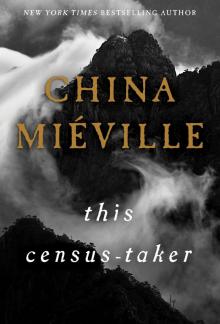 This Census-Taker
This Census-Taker Jack
Jack October: The Story of the Russian Revolution
October: The Story of the Russian Revolution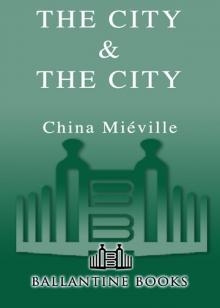 The City & the City
The City & the City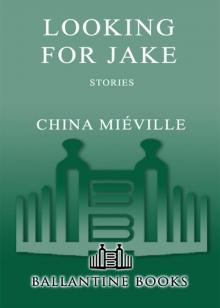 Looking for Jake: Stories
Looking for Jake: Stories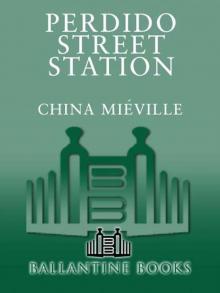 Perdido Street Station
Perdido Street Station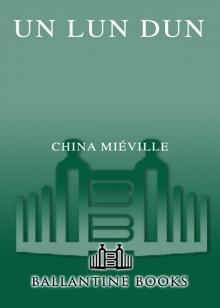 Un Lun Dun
Un Lun Dun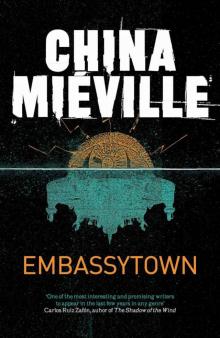 Embassytown
Embassytown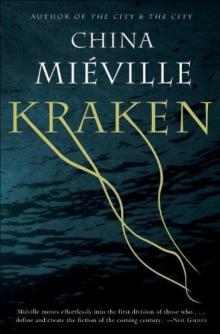 Kraken
Kraken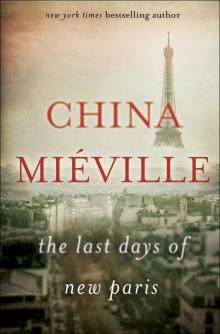 The Last Days of New Paris
The Last Days of New Paris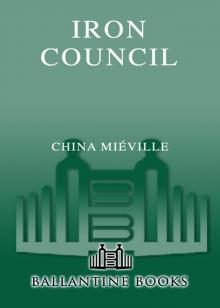 Iron Council
Iron Council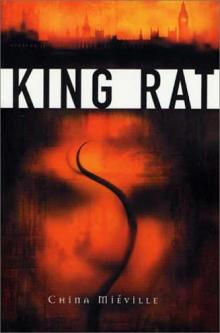 King Rat
King Rat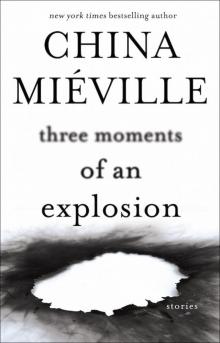 Three Moments of an Explosion
Three Moments of an Explosion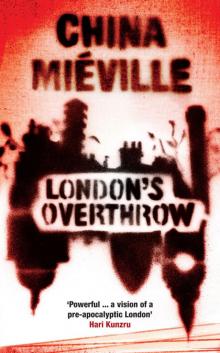 London's Overthrow
London's Overthrow October
October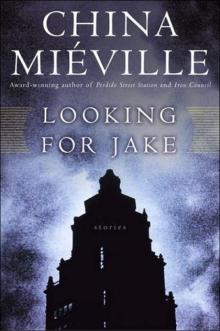 Jack (new crobuzon)
Jack (new crobuzon)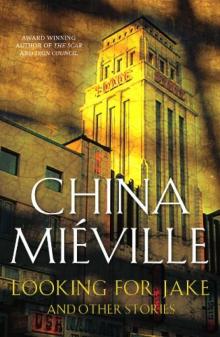 Looking for Jake and Other Stories
Looking for Jake and Other Stories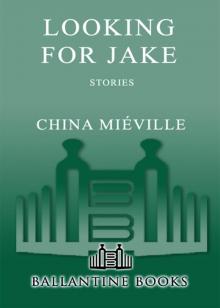 Looking for Jake
Looking for Jake